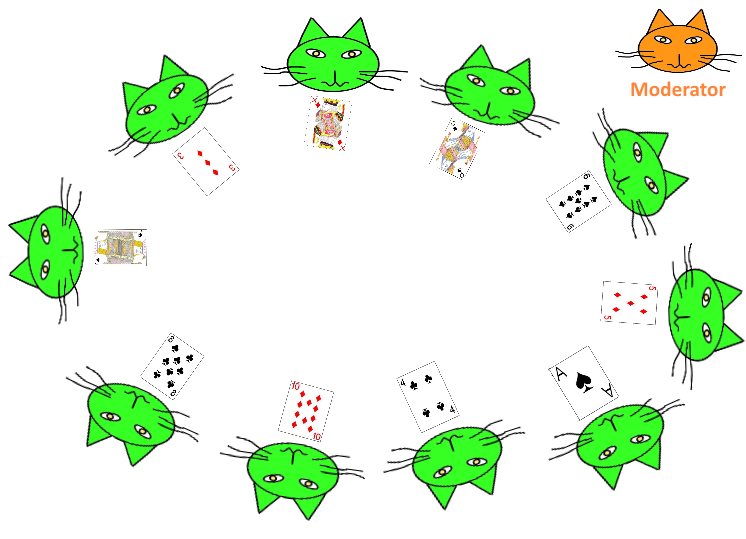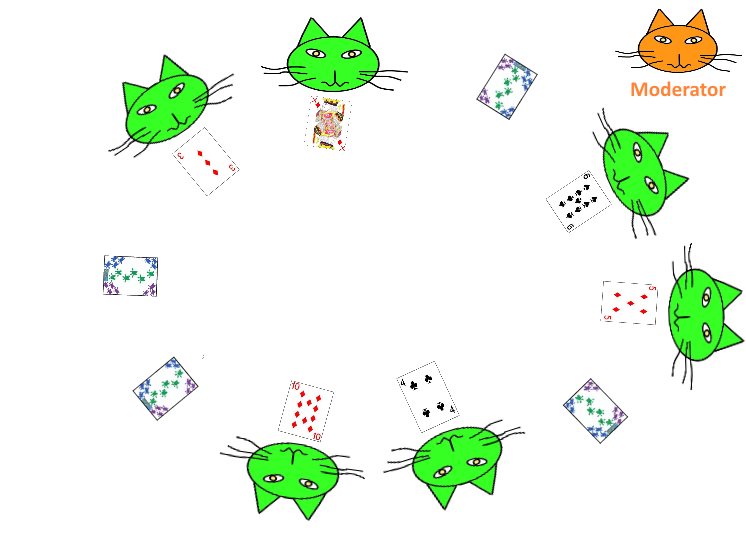In a foreign land a small, fledgling Nation has just gained it's independence. Shortly after the inception of this new nation, vast deposits of precious materials were discovered under the soil. As such, this small country quickly earned the attention of many other nations in the World, some with the expectations to exploit this new Nation and it's newfound resources. Ambassadors, Diplomats and Spies takes the player into the council chambers of this new Nation as representatives from other Nations vie for the political stability of this country. Will you be a Diplomat, trying to retain the sovereignty and vigor of this new Nation, or will you be a foreign spy, attempting to sway the balance of power for the advancement of your own Countries' agenda. Find out in this exciting game.
Special Roles: One of the most common changes or additions by many players is the including of additional roles in the game. This is often done with larger numbers of players. The following are some of the roles that can be added to this game:
- Double Agent
: The Double Agent is a unique role. When used, only one Double Agent is selected. This player actually is on the Diplomat team but opens his eyes when the Spies do. Thus, he will know the identity of all the Spy players but they will not necessarily know who he is. When this role is used, the Spy players can select another Spy player to deport and a unanimous selection is not necessarily required. Only a majority of those players are required to select a player for deportation. If there is no majority, no player is selected for deportation during that round.
- Night Watchman
: The player in this role is allowed to attempt to peek any time any of the other roles are revealed. However, if he is spotted by a Spy, he will most
undoubtedly be selected for deportation. He is considered to be on the Diplomat team for purposes of win conditions.
- Internal Agent
: The Internal Agent role is considered to be on the Spies team. When this role is used (and the player has not yet been deported) he has a round of his own, right after the Spies elect who they intend to deport during the round. This player opens his eyes when the normal spies do. However, after the Spies close their eyes, the Moderator calls for this player who then points to any one player. If the player he points to has a special role (such as the Special Investigator or a Diplomat) the player pointed to may not use his ability that round.
Additionally a number of changes to the existing roles or the gameplay is sometimes
made, usually to add variety to the game for veteran players:
Diplomat Changes: When this variant is used, the Diplomat may never select himself for Diplomatic Immunity. However, if uncertain he may elect to select no player during that round to have diplomatic immunity. Alternatively, some players restrict this player from providing Diplomatic Immunity to himself every other round (starting with the first round).
Changes to the Special Investigator: Some players prefer to make changes to the Special Investigator type role. This usually consist of disallowing the Special Investigator from having a turn on the first day, but would then have a turn on each subsequent round (as long as he was not forced to drop from the game).
Multiple Investigators: Some players include additional Special
Investigators. Thus, the Moderator would call each Special Investigator
to open his eyes on his own turn (such that they would not be aware of
the other players in the same role) and select a player they suspect to
be a Spy. As normal, any Spies which were selected would be arrested, dropping from the game.
Spies from many Nations: In this variant, each Spy is from a different Nation. Thus, there is no specific night phase for the Spies. Instead, during this portion, all the players including the Spies, would close their eyes and put their head down on the table. The Moderator would then name each person around the table, and if a Spy wants to select that individual for deportation during that round, he would raise his hand. The player with the majority of votes (including another Spy) for deportation would then be deported during the day round (unless receiving diplomatic immunity). If there is a tie for most votes, no player is deported this round.
Team Spies: In particularly large groups (20 or more participants), some players prefer to actually modify the game to include two distinct set of Spies (in addition to the standard roles). In this variant, each team of Spies works independently of the other and are not allied with the other team of Spies. Each team of spies (such as Spy group 1 and Spy group 2), would then be announced individually. Thus, in this variant, there are actually multiple distinct teams; the Diplomats, Spy Group 1, and Spy Group 2. The win condition for the Diplomats is the same, they must eliminate all spies. However, for a Spy group or faction to win, all members of the other Spy groups must have been deported or arrested and they must have the number of Ambassadors equal or less than the number of spies remaining. Thus, in this variant, each spy team would have a specific and distinct type of card to distinguish it from the other teams of spies. Each spy team would then have it's own independent turn during each round.
Three Players: Some players prefer to simplify the endgame for a situation in which the game currently has only three remaining active players, one spy and two Ambassadors. In this case, the conclusion of the game is determined by a handshake. Each player decides who he will shake hands with. There is usually a round of discussion before this is decided. If the two Ambassador team members shake hands, the Ambassador team wins. However, if the Spy shakes hands with an Ambassador the Spy team wins the game.
Copyright © 2015 CatsAtCards.com. All rights reserved.
 After the Moderator has created a deck consisting of the cards to be used, he then shuffles this deck and deals one card to each other player (excluding himself). Each player would then look at his individual card to determine his role for the game. He should ensure no other player sees his card (and thus knows his identify before the game begins).
After the Moderator has created a deck consisting of the cards to be used, he then shuffles this deck and deals one card to each other player (excluding himself). Each player would then look at his individual card to determine his role for the game. He should ensure no other player sees his card (and thus knows his identify before the game begins).
 After this, the day phase of the game begins. The Moderator thus instructs all
players to then open their eyes and raise their heads. The Moderator then provides a summary of the night cycles events. He beings by announcing any players have been selected to be deported by the Spies. This player would then be required to drop from the game. However, if the same player selected for deportation was also selected for diplomatic immunity for that day he is not deported and remains in the game. A deported player who must drop may still remain at the table but should not participate in any way in the remainder of the game. The Moderator would thus announce a player who was deported or not deported due to Diplomatic Immunity. If the Special Investigator had selected a Spy, this player would be arrested and would be forced to drop from the game. Arrested players may remain at the table but take no further actions in the current game. If the Special Investigator selected a non-spy nothing is announced or occurs.
After this, the day phase of the game begins. The Moderator thus instructs all
players to then open their eyes and raise their heads. The Moderator then provides a summary of the night cycles events. He beings by announcing any players have been selected to be deported by the Spies. This player would then be required to drop from the game. However, if the same player selected for deportation was also selected for diplomatic immunity for that day he is not deported and remains in the game. A deported player who must drop may still remain at the table but should not participate in any way in the remainder of the game. The Moderator would thus announce a player who was deported or not deported due to Diplomatic Immunity. If the Special Investigator had selected a Spy, this player would be arrested and would be forced to drop from the game. Arrested players may remain at the table but take no further actions in the current game. If the Special Investigator selected a non-spy nothing is announced or occurs.